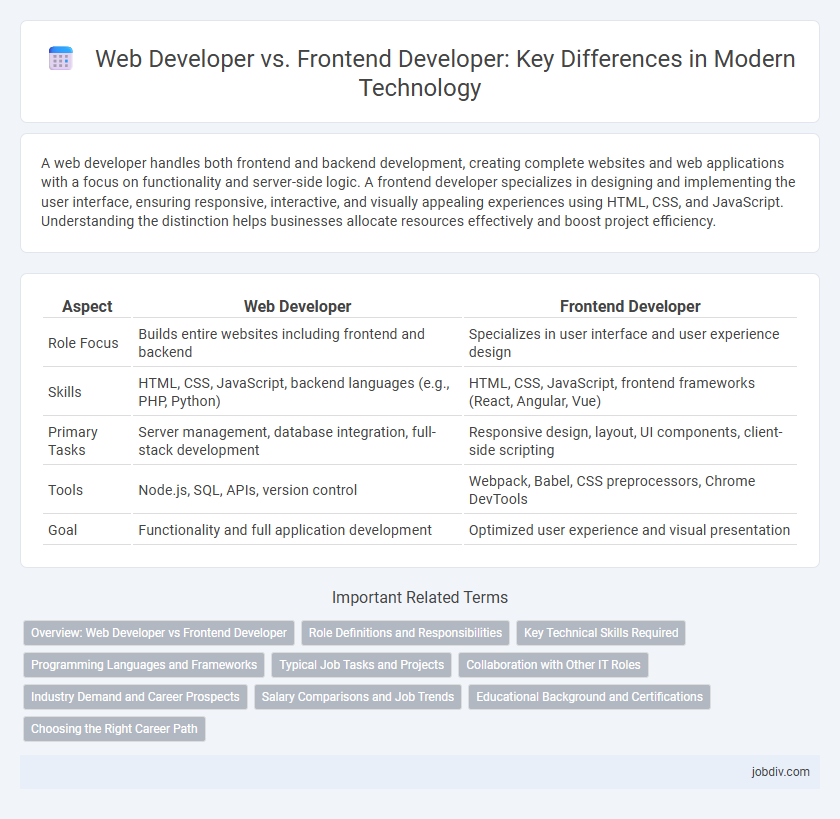A web developer handles both frontend and backend development, creating complete websites and web applications with a focus on functionality and server-side logic. A frontend developer specializes in designing and implementing the user interface, ensuring responsive, interactive, and visually appealing experiences using HTML, CSS, and JavaScript. Understanding the distinction helps businesses allocate resources effectively and boost project efficiency.
Table of Comparison
| Aspect | Web Developer | Frontend Developer |
|---|---|---|
| Role Focus | Builds entire websites including frontend and backend | Specializes in user interface and user experience design |
| Skills | HTML, CSS, JavaScript, backend languages (e.g., PHP, Python) | HTML, CSS, JavaScript, frontend frameworks (React, Angular, Vue) |
| Primary Tasks | Server management, database integration, full-stack development | Responsive design, layout, UI components, client-side scripting |
| Tools | Node.js, SQL, APIs, version control | Webpack, Babel, CSS preprocessors, Chrome DevTools |
| Goal | Functionality and full application development | Optimized user experience and visual presentation |
Overview: Web Developer vs Frontend Developer
Web developers build and maintain entire websites, handling both frontend and backend programming, databases, and server management, ensuring functional and user-friendly web experiences. Frontend developers specialize in designing and implementing the visual and interactive elements of a website using HTML, CSS, and JavaScript, prioritizing responsive design and user interface optimization. Both roles require proficiency in coding, but frontend developers focus more narrowly on client-side technology and user experience.
Role Definitions and Responsibilities
Web developers design and implement entire websites, managing both frontend and backend components to ensure seamless functionality and user experience. Frontend developers specialize in the user interface, using HTML, CSS, and JavaScript to create visually engaging and interactive web pages. Their responsibilities include optimizing performance, ensuring cross-browser compatibility, and integrating design with backend services.
Key Technical Skills Required
Web developers require proficiency in HTML, CSS, JavaScript, and backend languages such as Python, Ruby, or PHP, alongside database management and server configuration knowledge. Frontend developers specialize in HTML, CSS, JavaScript frameworks like React, Angular, or Vue.js, and responsive design principles to ensure seamless user interfaces. Both roles demand version control expertise, but frontend developers place greater emphasis on UX/UI optimization and cross-browser compatibility skills.
Programming Languages and Frameworks
Web developers typically work with a broad range of programming languages including HTML, CSS, JavaScript, and backend languages such as PHP, Python, or Ruby to build entire websites and web applications. Frontend developers specialize in client-side technologies, focusing on JavaScript frameworks and libraries like React, Angular, or Vue.js to create interactive and responsive user interfaces. Mastery of CSS preprocessors such as SASS or LESS and build tools like Webpack are also essential for frontend development to optimize performance and maintainability.
Typical Job Tasks and Projects
Web Developers typically handle both client-side and server-side coding, managing full-stack development tasks like database integration, server scripting, and API management, while Frontend Developers concentrate on designing and implementing user interfaces using HTML, CSS, and JavaScript frameworks such as React or Angular. Projects for Web Developers often include developing dynamic websites, web applications, and ensuring cross-platform functionality, whereas Frontend Developers focus on creating responsive layouts, enhancing user experience, and optimizing site performance for various devices. Both roles require collaboration with UX/UI designers and backend developers to deliver seamless, functional web solutions.
Collaboration with Other IT Roles
Web developers and frontend developers collaborate closely with UX/UI designers, backend developers, and QA engineers to ensure seamless integration and optimal user experience. Web developers often coordinate full-stack responsibilities, bridging client-side interfaces with server-side logic, while frontend developers specialize in translating design mockups into interactive, responsive web pages. Effective communication and version control tools like Git streamline workflow, enabling teams to address bugs, implement features, and meet project deadlines efficiently.
Industry Demand and Career Prospects
Web developers and frontend developers both face strong industry demand, with web developers often required to have broader skills including backend technologies, enhancing their versatility in full-stack roles. Frontend developers, specializing in user interface and experience design using frameworks like React and Angular, are increasingly sought after due to the critical importance of responsive, interactive websites. Career prospects for frontend developers show rapid growth driven by the rise of mobile and web applications, while web developers benefit from opportunities in diverse industries seeking comprehensive web solutions.
Salary Comparisons and Job Trends
Web developers earn an average annual salary of $75,000, while frontend developers typically command higher wages around $85,000 due to specialized skills in user interface design and JavaScript frameworks. Job trends show a growing demand for frontend developers driven by the expansion of web applications and the need for responsive, interactive websites. Market data from 2023 indicates frontend development roles are increasing at a 12% annual growth rate, outpacing overall web developer job growth at 8%.
Educational Background and Certifications
Web Developers typically possess a broader educational background in computer science or information technology, covering both frontend and backend technologies, while Frontend Developers often specialize in design, user experience, and frontend languages like HTML, CSS, and JavaScript. Certifications such as the Microsoft Certified: Azure Developer Associate or Certified Web Professional-Web Developer validate a Web Developer's comprehensive skill set, whereas Frontend Developers benefit from credentials like the Certified Frontend Developer from freeCodeCamp or Google's Mobile Web Specialist. Specialized training in frameworks like React or Angular is essential for Frontend Developers, while Web Developers may pursue full-stack certifications to demonstrate proficiency in both client-side and server-side programming.
Choosing the Right Career Path
Choosing between a Web Developer and a Frontend Developer hinges on career goals and skill preferences; Web Developers manage both client-side and server-side programming, while Frontend Developers specialize in user interface design and user experience optimization. Mastery of HTML, CSS, and JavaScript is essential for Frontend Developers, whereas Web Developers require knowledge of backend languages like PHP, Python, or Ruby. Understanding job market demand and industry trends helps candidates align their education and experience with roles offering the best growth and salary prospects.
Web Developer vs Frontend Developer Infographic

 jobdiv.com
jobdiv.com